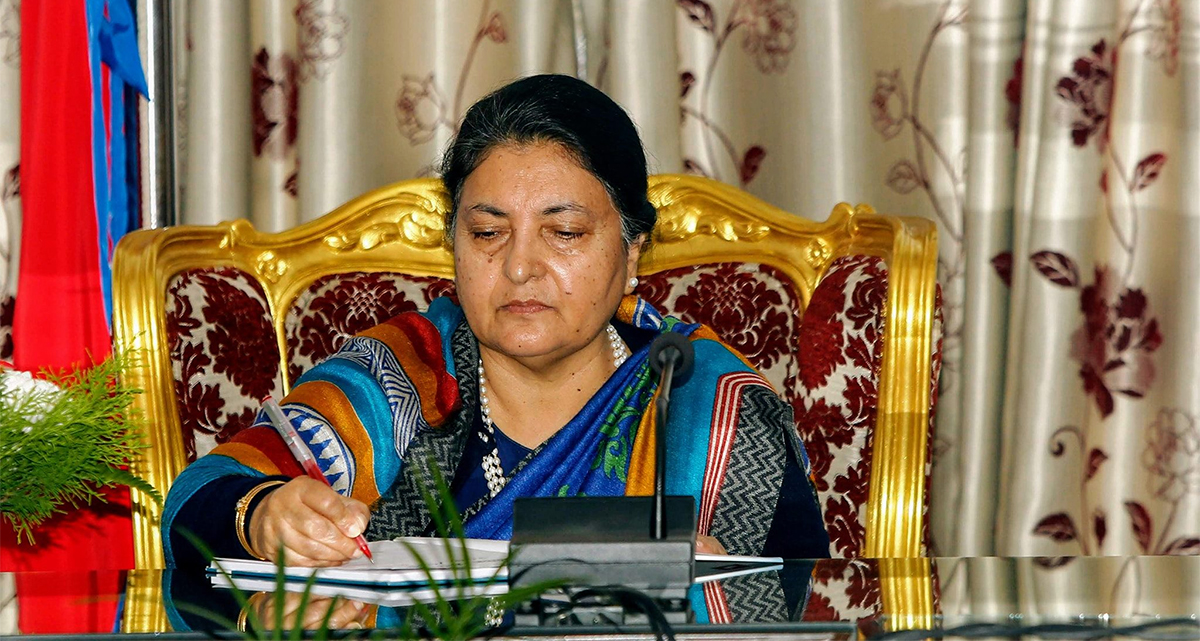It has been 10 days since the Citizenship Bill was sent to the president for authentication for a second time after it was passed by both Houses of Parliament.
There is a clear constitutional provision that requires the president to authenticate a bill within 15 days if it is sent for authentication for a second time.
But why has the president not authenticated the bill yet? What will happen to the bill if she does not authenticate it? These are questions of great interest to many at present.
The term of the House of Representatives (HoR) ends after Saturday midnight.
Many law experts say the Citizenship Bill will be deactivated if it is not authenticated before the HoR’s term expires.
The experts suspect that the president could sit on the bill until Saturday (September 16) and then say that the bill has been deactivated with the end of the HoR’s term.
They say the prohibitive clause in Article 111(10) of the Constitution states that a bill under consideration will lapse with the expiry of the HoR’s term.
Article 111 of the Constitution mentions the procedures for adoption of bills. In sub-article 10, it states that deliberations on a bill may continue at the succeeding session even if a House session is prorogued while the bill is under its consideration.
However, the prohibitive clause in the same sub-article states that bills in both Houses will lapse with the expiry of the HoR’s term.
The prohibitive clause states: “Provided that in case the House of Representatives is dissolved or its term expires when any Bill introduced in the House of Representatives is under its consideration or when any Bill adopted by the House of Representatives is under consideration in the National Assembly, such Bill shall lapse.”
According to this prohibitive clause, only a bill under consideration in the HoR or a bill passed by the HoR and under consideration in the National Assembly will be deactivated, said constitution expert Purna Man Shakya.
“This clause does not say that bills sent for authentication after being passed by both Houses will also be deactivated with the expiry of the HoR’s term,” Shakya said. “It has clearly stated that only a bill introduced in the House of Representatives and under its consideration or under consideration in the Upper House (National Assembly) will be deactivated with the end of the House of Representatives’ term.”
Therefore the president has no alternative to authenticating the bill, he added.
“A bill that has been passed by both Houses and sent for authentication again even after it was sent back by the president will not be deactivated. The president has no alternative to authenticating the bill,” said Shakya.
President Bhandari on August 14 had returned the Citizenship Bill sent to her for authentication after being passed by both the HoR and the National Assembly. She had sent a seven-point message to inform the federal parliament and for deliberation, and another eight-point message for drawing attention.
President Bhandari had mainly raised two issues while sending the bill back. She had mentioned that the bill is silent about the provision of naturalized citizenship through marriage as per Article 11(6) of the Constitution.
"If a foreign woman married to a Nepali citizen so wishes, she may acquire naturalized citizenship of Nepal as provided for in a Federal law," states Article 11(6) of the Constitution. President Bhandari had pointed that the Constitution clearly says federal law but the bill passed by the federal parliament does not have that provision.
She had also raised question about the provision requiring self-declaration by a woman to provide citizenship to her children.
She had also drawn the House's attention to other issues but had mainly asked the House to reconsider the two issues.
The bill does not propose any restrictions on foreigners marrying Nepali citizens while acquiring naturalized citizenship. The main opposition CPN-UML, to which Bhandari was affiliated before becoming president, has been protesting removal of the provision in the report submitted by the State Affairs and Good Governance Committee of the HoR that required foreigners marrying Nepali citizens to wait for seven years to get naturalized citizenship.
The bill passed by the federal parliament also has a provision to grant citizenship by descent to the children of those who received citizenship by birth through a one-time arrangement after the Janaandolan II in 2006.
Citizenship by birth was granted to persons born in Nepal before mid-April 1990, and having permanent domicile and been continuously resident in Nepal throughout their life through the one-time arrangement.
The passed bill also allows citizenship to a person only through the name of mother but has put four conditions for that. The child should be born in Nepal, should be residing in Nepal, father should be unidentified and the person should make self-declaration that the father has not been identified for that.
The person taking the citizenship certificate can choose to take the surname and address of either the father or mother. The bill has also paved the way for non-resident citizenship to anyone living outside the SAARC countries if there is proof that the person's father/mother or grandfather/grandmother is/was a Nepali citizen.
President Bhandari had earlier authenticated an ordinance, sent by the then prime minister KP Sharma Oli after dissolving the House, that included similar provisions.

